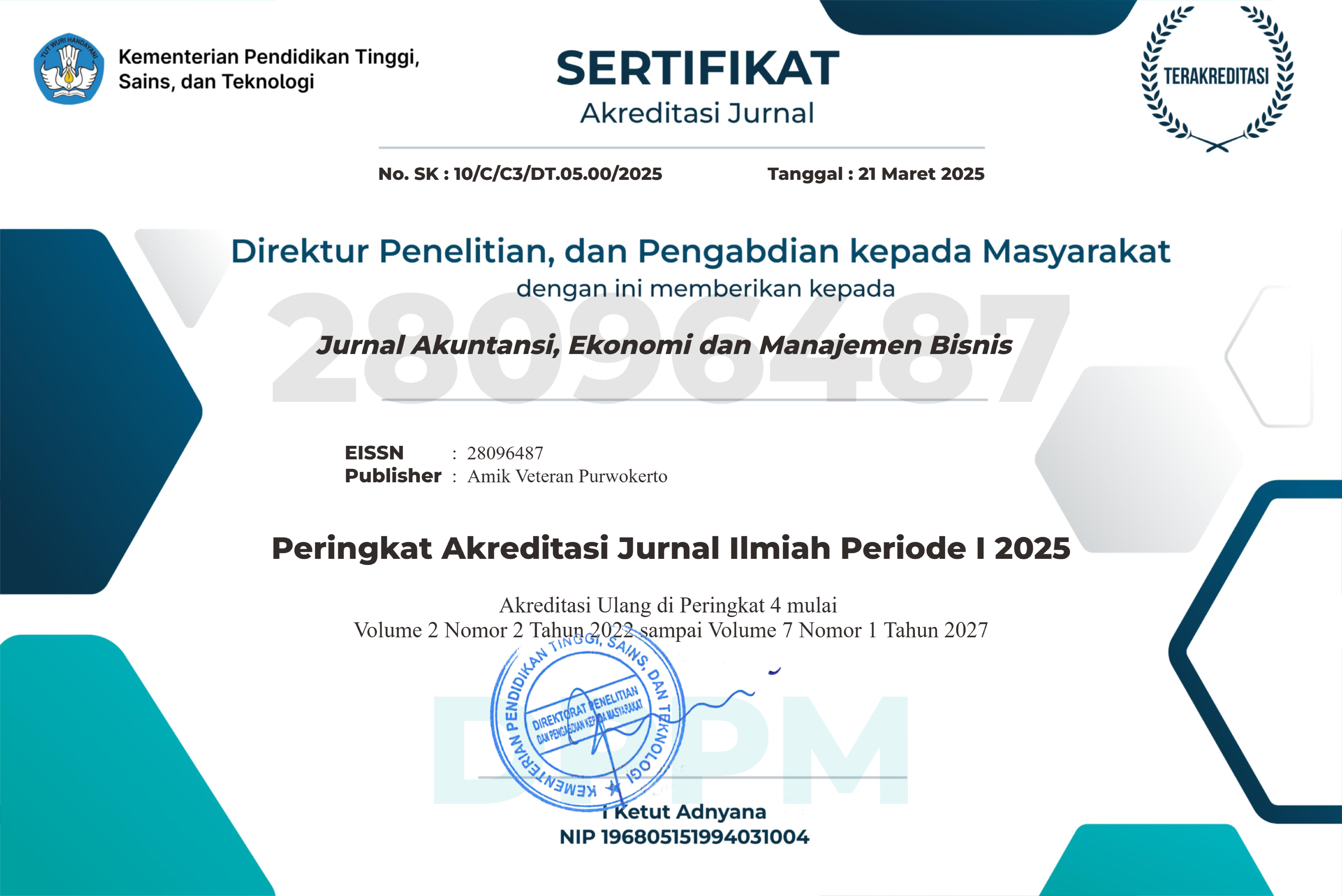ENTREPRENEURIAL INTENTION DI KALANGAN MAHASISWA DI SURABAYA DALAM TINJAUAN COGNITIVE FLEXIBILITY DAN RISK-TAKING PROPENSITY
DOI:
https://doi.org/10.55606/jaemb.v3i2.1943Keywords:
risk-taking propensity, Entrepreneurial intention, cognitive flexibilityAbstract
Entrepreneurship is a skill that needs to be possessed by the younger generation and should be nurtured from an early age. This study aims to explain the impact of risk-taking propensity and cognitive flexibility on entrepreneurial intention in final year students in Surabaya. The research method used is quantitative research. The study population consisted of final year students in the city of Surabaya, with a sample size of 130 respondents. The variables studied include risk-taking propensity, cognitive flexibility, and entrepreneurial intention. Data was collected using a questionnaire. Data processing methods include validity and reliability tests, as well as classical regression assumptions and multiple linear regression. The research findings show that risk-taking propensity and cognitive flexibility have a positive and significant influence on entrepreneurial intention.
Entrepreneurship is a skill that needs to be possessed by the younger generation and should be nurtured from an early age. This study aims to explain the impact of risk-taking propensity and cognitive flexibility on entrepreneurial intention in final year students in Surabaya. The research method used is quantitative research. The study population consisted of final year students in the city of Surabaya, with a sample size of 130 respondents. The variables studied include risk-taking propensity, cognitive flexibility, and entrepreneurial intention. Data was collected using a questionnaire. Data processing methods include validity and reliability tests, as well as classical regression assumptions and multiple linear regression. The research findings show that risk-taking propensity and cognitive flexibility have a positive and significant influence on entrepreneurial intention.
References
Antoncic, J. A., Antoncic, B., Gantar, M., Hisrich, R. D., Marks, L. J., Bachkirov, A. A., Li, Z., Polzin, P., Borges, J. L., Coelho, A., & Kakkonen, M.-L. (2018). Risk-Taking Propensity and Entrepreneurship: The Role of Power Distance. Journal of Enterprising Culture, 26(01), 1–26. https://doi.org/10.1142/s0218495818500012
Asmara, H. W., Djatmika, E. T., & Indrawati, A. (2016). The effect of need for achievement and risk taking propensity on entrepreneurial intention through entrepreneurial attitude. IOSR Journal of Business and Management, 18(6), 117-126.
Carree, M. A., & Thurik, A. R. (2010). The Impact of Entrepreneurship on Economic Growth. Handbook of Entrepreneurship Research, 2(2), 557–594. https://doi.org/10.1007/978-1-4419-1191-9_20
Farouq, T., & Dadwal, S. (2018). The impact of entrepreneurship on economic growth and development in the UK. International Journal of Entrepreneurship Management Innovation and Development, 2(2), 116 – 146.
Ghozali, I. (2009). “Aplikasi Analisis Multivariate dengan Program SPSS“. Semarang : UNDIP.
Gonzalez, M. A., Portillo, A. F., & Caser, J. C. D. (2010). Entrepreneurial activity and economic growth. A multi-countryanalysis. European Research on Management and Business Economics, 26(2020) 9–17
Holtzhausen, J. P., & Naidoo, V. (2016). Critical assessment of risk-taking behavior and economic performance of male entrepreneurs in the Centurion central business district in South Africa. Investment Management and Financial Innovations, 13(3), 93-104.
Ismail, K., Anuar, M. A., Omar, W. Z. W., Aziz, A.A., Seohod, K., & Akhtar, S. (2015). Entrepreneurial intention, entrepreneurial orientation of faculty and students towards commercialization. Social and Behavioral Sciences, 181 (1), 349 – 355
Kuncoro, M. (2003). Metode riset untuk bisnis & ekonomi: Bagaimana Meneliti & menyusun Tesis?, Jakarta: Erlangga
Kurniawan, D., Setiawan, D., & Kusumajaya, R. A. (2020). Analisis Mahasiswa Kota Kendal Dalam Menggunakan E-Money dengan Metode TAM. Kompak: Jurnal Ilmiah Komputerisasi Akuntansi, 13(1), 138-142.
Kurniawan, S. (2020, February 4). Di tengah ketidakpastian, temukan momentum. Marketeers. Retrieved from https://marketeers.com/di-tengah-ketidakpastian-temukan-momentum/
Mahardhika, W. A. (2020, January 21). Ini skill yang dibutuhkan untuk jadi pengusaha.Kompas. Retrieved from https://money.kompas.com/read/2020/01/21/143300126/ini-skill-yang-dibutuhkan-untuk-jadi-pengusaha?page=all
Priyatno. (2014). SPSS 22: Pengolahan Data Terpraktis. Yogyakarta: ANDI.
Saunders, M., Lewis, P., & Thornhill, A. (2009). Research methods for business students. Pearson education.
Sugiyono. (2015). Metode Pengembangan dan Penelitian. Bandung: ALFABETA.
Sumarno, J. T. (2016, October 14). Bisnis tidak pernah lepas dari perubahan lingkungan. Suara Surabaya. Retrieved from https://www.suarasurabaya.net/ekonomibisnis/2016/Bisnis-Tidak-Pernah-Lepas-Dari-Perubahan-Lingkungan/
Downloads
Published
How to Cite
Issue
Section
License
Copyright (c) 2023 Jurnal Akuntansi, Ekonomi dan Manajemen Bisnis

This work is licensed under a Creative Commons Attribution-ShareAlike 4.0 International License.








